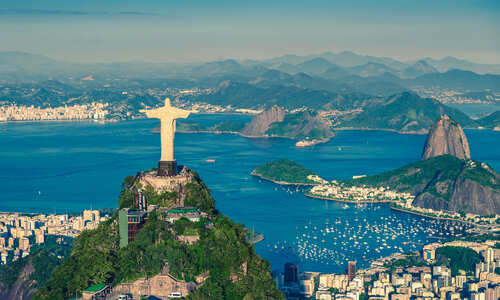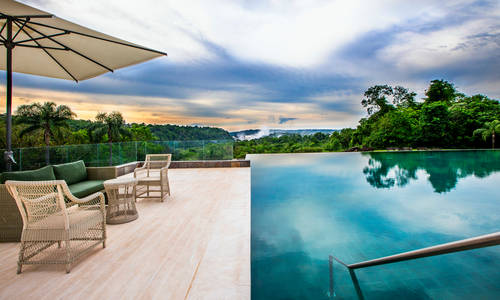Article content
24 September 2012 by Alex Stewart
BBC Special Correspondent Fergal Keane finds melancholy and magic in the Argentinian capital, Buenos Aires.
On the avenue Raul Scalabrini Ortiz,a young mechanic was standing outside a garage and pouring cup after cup of water over his head. His older fellow workers, lounging in the shade, were laughing. It was 36 degrees centigrade and there was no wind. The sky was a brilliant blue.
I was bewildered, caught in the never-land of the eternally jet-lagged. In the last few weeks I had travelled from Burma to Thailand to London to Lebanon to Jordan... and now to Buenos Aires in the middle of its summer heat.
The images of the long journey crowded my thoughts: glinting pagodas and the birth of hope in Rangoon, snow-covered mountains on the border between Lebanon and Syria, a child herding sheep under a crimson sun in Jordan.
Normally I try to make sure there is a decent break between journeys. I need to shed the restlessness of the road, reacclimatise myself to home and family. But the squabble between London and Buenos Aires over the future of the Falkland Islands had escalated into a furious rhetorical battle. And so the inevitable text message came from the news desk: how soon can you get to Argentina? Landing in Buenos Aires, I was grumpy. I cursed all sides. I was ready to hate this city.
Foolish me. Ignorant me. A week later I left Buenos Aires promising myself that I would return as soon as I could. My change of heart was swift. I was lucky to have been booked into a small hotel on Malabia Street in the heart of Palermo Soho, a neighbourhood of tree-lined little streets and sidewalk cafés that was founded in the late sixteenth century and named in honour of Saint Benedict the Moor, patron saint of Palermo, Sicily.
As a foreign correspondent, I love discovering hotels where the staff greet you by name every morning and know what kind of coffee you like to drink, where the doormen look as if they have studied all the mysteries of the city and can answer any question that comes into your head. This kind of hotel has a distinct place in its community, instead of being marooned on its own vast grounds, cocooned in blandness.
The city of Buenos Aires combines grandeur, romance and melancholy. From its humble origins as a garrison town on the banks of the River Plate, it absorbed migrants from Spain, Italy, Britain, the Middle East and the rest of Latin America, to become the third largest city in Latin America. Buenos Aires now has a population of around 13 million people.
Palermo has been home to some of the most famous sons of Argentina. Ernesto 'Che' Guevara lived here for a time. In 1931 his parents moved into a flat near Palermo Park, where today the unemployed and the off-duty sleep in the shade of palm trees. Federico García Lorca visited in 1933 - three years before his murder at the hands of Franco's thugs. He met with the Argentine poet Jorge Luis Borges, another resident of Palermo. They did not become friends.
Later Borges would say of Lorca: "I met him only once in Buenos Aires. And then, it was a lucky thing for him to be executed. Best thing to happen for a poet." In the cynical view of Borges, martyrdom guaranteed literary immortality. Borges may have felt that his own reputation as a writer would be eclipsed by that of Lorca. He need not have worried. There was room for them both in the pantheon of literary greats.
Of his native Buenos Aires, Borges would write:
"And the city, now, is like a map
Of my humiliations and failures;
From this door, I have seen the twilights
And at this marble pillar I have waited in vain."
They are lines that evoke much of the country's modern history: the chronic instability engendered by military coups, guerrilla war and the cult of personality.
A short taxi-ride from Palermo downtown takes you to the Plaza de Mayo. Here Eva Peron, the 'Evita' of legend, addressed vast crowds from the balcony of the Casa Rosada - the famous Pink Palace from where her husband Juan Peron ruled Argentina.
The Plaza was also the setting for one of the bravest demonstrations of the modern age. Here the mothers of children 'disappeared' by the military junta in the Seventies and Eighties campaigned for justice, for more than three decades.
Not far away is the fabled Café Tortoni, the oldest coffee shop in Argentina. Established in 1858, it retains the fin de siècle ambience that has drawn visitors as diverse as the poet Lorca and King Juan Carlos of Spain.
The Tortoni is like the city it adorns. The great charm of Buenos Aires lies in its refusal to bow down before the gods of modernity. Little wonder that a dance as passionate and elemental as the tango should be born and thrive in these parts.
In its architecture, literature and dance, in the elegance of its beautiful women and handsome men, in the stories that are revealed from its often turbulent history, Buenos Aires is a city that moves the soul.

Article originally published in
Vol 42, No 2, 2012
.










